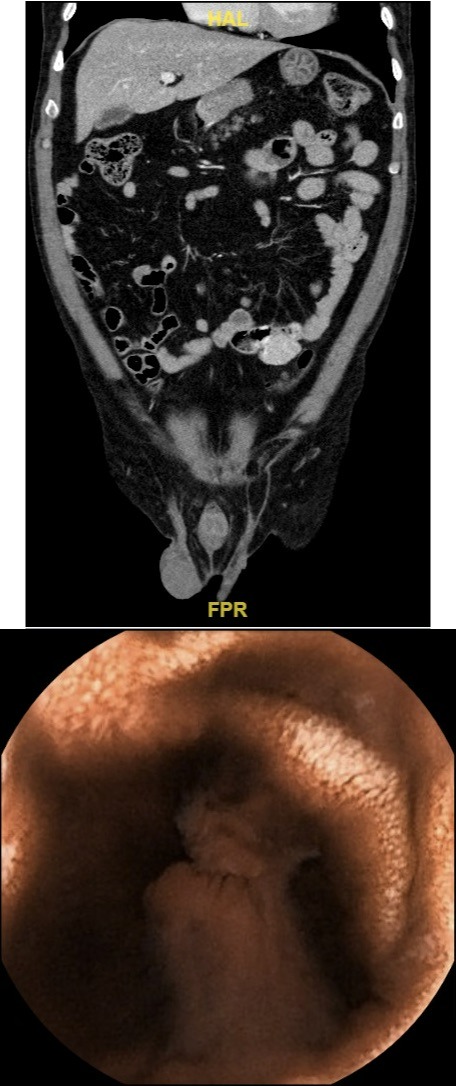Back
Poster Session E - Tuesday Afternoon
E0668 - Bleeding From a Rare Omental Gastrointestinal Stromal Tumor Found on Capsule Endoscopy
Tuesday, October 25, 2022
3:00 PM – 5:00 PM ET
Location: Crown Ballroom

Aida Rezaie, MD
Creighton University
Phoenix, AZ
Presenting Author(s)
Aida Rezaie, MD1, Kayvon Sotoudeh, MD1, Indu Srinivasan, MD2, Keng-Yu Chuang, MD2
1Creighton University, Phoenix, AZ; 2Valleywise Health, Phoenix, AZ
Introduction: Gastrointestinal stromal tumors (GISTs) are the most common mesenchymal tumors involving the gastrointestinal tract compromising approximately 1 -2 % of gastrointestinal cancers. They can arise from the bowel wall as a subepithelial neoplasm in the stomach and small intestine, and less than 5% of them arise as extragastrointestinal tumors in the retroperitoneum, mesentery and omentum. They occur in older adults aged 65 to 69 years old, and vary in their presentation depending on their location. We present a unusual case of small bowel gastrointestinal bleeding from a GIST adherent to the omentum.
Case Description/Methods: 58 year old male with a history of diabetes mellitus type II, hypertension, recent prolonged hospitalization for disseminated nocardia infection on long term antibiotics and a Decadron taper presented with several days of epigastric pain, nausea and non-bloody diarrhea. He denied any signs of gastrointestinal bleeding such as melena or hematochezia. His labs were notable for a hemoglobin of 4.2 g/dL with a mean corpuscular volume of 78.5 fL that was previously noted to be within normal limits. Computed tomography of the abdomen and pelvis with contrast showed a 4 cm circumscribed, hyperdense enhancing exophytic solid mass arising from the small bowel in the left lower quadrant with adjacent hyperenhancement. The patient subsequently underwent capsule endoscopy which showed fresh blood in the mid jejunum with more active bleeding surrounding a possible small bowel tumor. Due to ongoing bleeding and anemia, the patient underwent laparoscopic small bowel resection and lymphadenectomy of a small bowel tumor adherent to the omentum with about 10 cm of proximal and distal margins. Pathology was consistent with a low-grade gastrointestinal stromal tumor approximately 3.0 x 3.0 x 2.3 cms with tumor free margins and no evidence of lymphovascular spread. Thereafter, the patient remained hemodynamically stable with improvement of his blood counts and was discharged home.
Discussion: While GISTS are common findings in the gastrointestinal tract, only a small percentage of them can cause gastrointestinal bleeding needing surgical intervention. Surgical resection remains the mainstay of treatment for localized, non-metastatic GISTs that present with bleeding as it can both stop the bleeding and resect the lesion. However, other modalities of treatment include endoscopic intervention depending on the location or transcatheter arterial embolization.

Disclosures:
Aida Rezaie, MD1, Kayvon Sotoudeh, MD1, Indu Srinivasan, MD2, Keng-Yu Chuang, MD2. E0668 - Bleeding From a Rare Omental Gastrointestinal Stromal Tumor Found on Capsule Endoscopy, ACG 2022 Annual Scientific Meeting Abstracts. Charlotte, NC: American College of Gastroenterology.
1Creighton University, Phoenix, AZ; 2Valleywise Health, Phoenix, AZ
Introduction: Gastrointestinal stromal tumors (GISTs) are the most common mesenchymal tumors involving the gastrointestinal tract compromising approximately 1 -2 % of gastrointestinal cancers. They can arise from the bowel wall as a subepithelial neoplasm in the stomach and small intestine, and less than 5% of them arise as extragastrointestinal tumors in the retroperitoneum, mesentery and omentum. They occur in older adults aged 65 to 69 years old, and vary in their presentation depending on their location. We present a unusual case of small bowel gastrointestinal bleeding from a GIST adherent to the omentum.
Case Description/Methods: 58 year old male with a history of diabetes mellitus type II, hypertension, recent prolonged hospitalization for disseminated nocardia infection on long term antibiotics and a Decadron taper presented with several days of epigastric pain, nausea and non-bloody diarrhea. He denied any signs of gastrointestinal bleeding such as melena or hematochezia. His labs were notable for a hemoglobin of 4.2 g/dL with a mean corpuscular volume of 78.5 fL that was previously noted to be within normal limits. Computed tomography of the abdomen and pelvis with contrast showed a 4 cm circumscribed, hyperdense enhancing exophytic solid mass arising from the small bowel in the left lower quadrant with adjacent hyperenhancement. The patient subsequently underwent capsule endoscopy which showed fresh blood in the mid jejunum with more active bleeding surrounding a possible small bowel tumor. Due to ongoing bleeding and anemia, the patient underwent laparoscopic small bowel resection and lymphadenectomy of a small bowel tumor adherent to the omentum with about 10 cm of proximal and distal margins. Pathology was consistent with a low-grade gastrointestinal stromal tumor approximately 3.0 x 3.0 x 2.3 cms with tumor free margins and no evidence of lymphovascular spread. Thereafter, the patient remained hemodynamically stable with improvement of his blood counts and was discharged home.
Discussion: While GISTS are common findings in the gastrointestinal tract, only a small percentage of them can cause gastrointestinal bleeding needing surgical intervention. Surgical resection remains the mainstay of treatment for localized, non-metastatic GISTs that present with bleeding as it can both stop the bleeding and resect the lesion. However, other modalities of treatment include endoscopic intervention depending on the location or transcatheter arterial embolization.

Figure: Figure 1: CT Abdomen and Pelvis with contrast demonstrating a 4 cm circumscribed hyperdense enhancing exophytic solid mass arising from the small bowel in the left lower quadrant. Figure 2: Capsule endoscopy showing a small bowel tumor.
Disclosures:
Aida Rezaie indicated no relevant financial relationships.
Kayvon Sotoudeh indicated no relevant financial relationships.
Indu Srinivasan indicated no relevant financial relationships.
Keng-Yu Chuang indicated no relevant financial relationships.
Aida Rezaie, MD1, Kayvon Sotoudeh, MD1, Indu Srinivasan, MD2, Keng-Yu Chuang, MD2. E0668 - Bleeding From a Rare Omental Gastrointestinal Stromal Tumor Found on Capsule Endoscopy, ACG 2022 Annual Scientific Meeting Abstracts. Charlotte, NC: American College of Gastroenterology.
